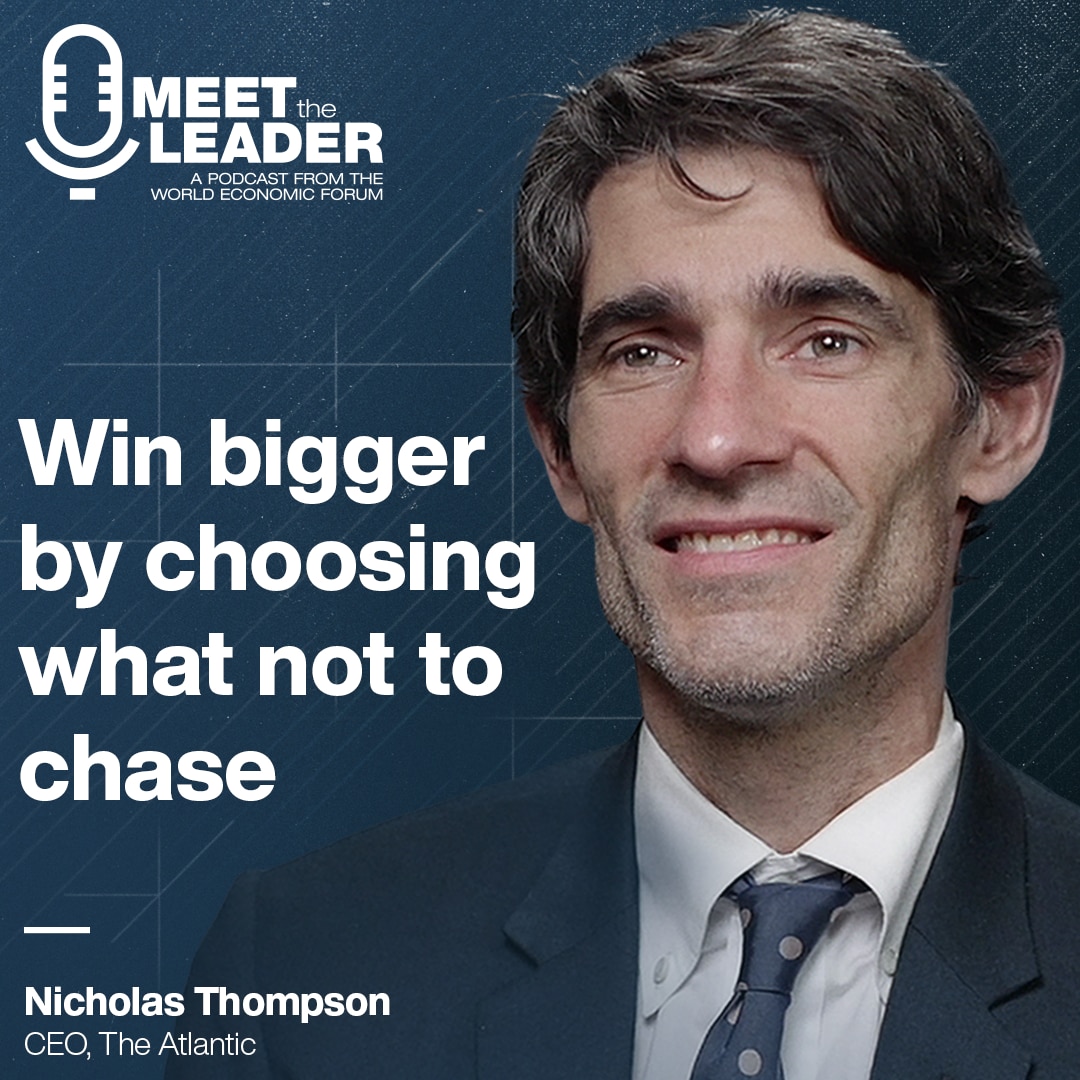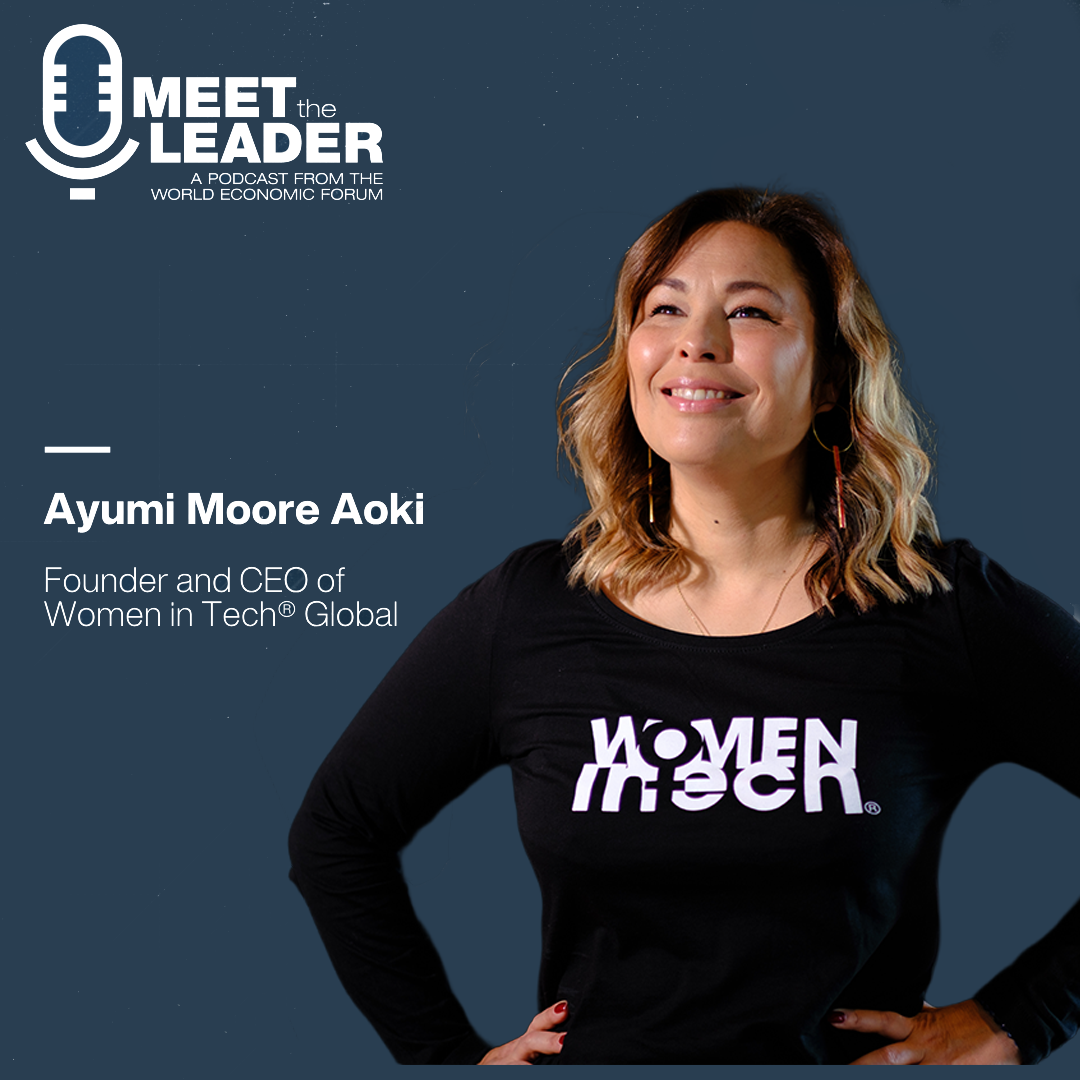What a single mom who took on the prison system can teach about making change happen
Transcripción del podcast
Young Global Leaders: Future of Leadership Series:
Jessica is a Young Global Leader, a group of more than 1,400 innovators, entrepreneurs, technology pioneers, educators, activists, artists, journalists, and more, working to make change happen. This is the first in an ongoing series spotlighting leaders from this community.
Linda Lacina, Meet The Leader Welcome to Meet the Leader podcast, where top leaders share how they're tackling the world's toughest challenges.
Today we talk to Jessica Jackson of the Reform Alliance. That's a nonprofit and movement reshaping the criminal legal system. She'll tell us what this single mom did to take on the prison system and what that can teach all of us about making change happen.
Subscribe to Meet the Leader on Apple, Spotify and wherever you get your favorite podcasts. And don't forget to rate and review us. I'm Linda Lacina from the World Economic Forum. And this is Meet the Leader.
Jessica Jackson, The Reform Alliance It really presents a threat to public safety. When you have a person who has done the hard work of securing housing, securing transportation, securing a job, and then they missed a meeting with their probation officer, and you take them out of that security and put them in a prison. You have now destabilized somebody.
Linda Lacina, Meet The Leader Excessive incarceration impacts millions in just the United States alone. It can also kick off a vicious cycle.
Inmates released and on probation face more than stigma. They often have to navigate an impossible to follow set of rules and conditions that are applied regardless of crime, ones that often don't have a connection to public safety. Conditions that if broken, can send even nonviolent criminals back to prison again and again.
Filling jails with those who have violated a supervision condition pushes the possibility of a new rebuilt life further and further out of reach.
Jessica Jackson is the chief advocacy officer and the chief operations officer at The Reform Alliance. That's a nonprofit that seeks to transform probation and parole laws all across the U.S. to tackle state, federal and county and even international issues. Jessica has seen the damage done by excessive incarceration firsthand. In fact, as a young mother with a GED and a two month old, she watched her then husband be sentenced to six years in prison. It was a life changing moment, one that drove this young mom and housewife to go to college, and then law school, and then to build a movement.
Her work has passed key bills that reform sentencing and reduce repeat offenders. It has been an emotional journey and she'll talk to us about her experience and how outdated thinking can lead to criminal justice policies that erode families and communities.
She'll talk about all of that. But first, she'll talk more about excessive incarceration.
Jessica Jackson, The Reform Alliance The United States has 5% of the world's population, but we have 25% of the world's incarcerated population.
In addition to that, 25% of the world's incarcerated population, which is about 1.9 million people, we also have the largest supervision system. So these are people who are not incarcerated currently, but are on some form of supervision where they're required to check in with a supervision officer. And oftentimes they are just as at risk as the people who are incarcerated of being incarcerated because they're living under a very, very onerous framework of conditions that, if violated at any point, could send them back to prison.
What we seek to do is to disrupt the cycle of mass supervision to mass incarceration
”So that includes meeting with your probation officer, making your payments on time, holding down employment, things that the rest of us struggle with, but that for them presents a risk of incarceration.
And there's 4.65 million people when Reform got started who were on some form of supervision in the United States. Now we've got about 3.8 million.
What we seek to do is to disrupt the cycle of mass supervision to mass incarceration. And the way that we do that is a data driven way. We have looked at the evidence and seen that your return on investment for keeping a person on supervision really sharply declines after the first two years. Yet many probation and parole sentences extend decades.
So one thing we're doing is making sure that states and now also the federal government have caps on how long a person can be on probation. This can look a variety of different ways depending on the state. In California, we passed a bill that capped probation at two years for felonies, one year for misdemeanors.

In other states, like our most recent one in Pennsylvania, we've set up systems where a person is presumed to be terminated from probation after 2 or 4 years. But they do have to go in front of a judge and have a have a conference about it before it's terminated.
We also work to reduce the number of conditions that are placed on a person.
So oftentimes when a judge puts a person on probation or parole, they have a standard list of conditions. Now, I believe there might be some conditions that make sense, right? If you have gotten a DUI, driving under the influence, maybe it makes sense that you can't be drinking while you're on probation or parole. However, that's something that's extended to everybody on probation and parole. You know, maybe if you've had a crime of violence, you'd have to do anger management and something like that. That makes sense for certain people, not everybody. Right. So we've been trying to narrowly tailor the conditions that are being placed on people so that they actually bear relationship to the crime that was committed and a relationship to increasing public safety.
We also have been changing the punishment for breaking those conditions. So like I said, people all across the country are sitting in jails and prisons right now for having violated a condition of their probation, not necessarily for having committed a new crime, but for having violated a condition of their probation. In fact, it's 42% of our jail and prison population that's in there for a supervision violation.
So we are trying to change how the system deals with these supervision violations. Get rid of technical violations or create a graduated sanction system where a person might get warnings because it really presents a threat to public safety.
When you have a person who has done the hard work of securing housing, securing transportation, securing a job, getting into a good situation with their children, and then they missed a meeting with their probation officer, and you take them out of that security and put them in a prison. You have now destabilized somebody.
And I've seen this happen firsthand. In fact, my ex-husband was incarcerated and has as hard as it was on our family for him to be incarcerated during our marriage, it was much harder for him when he came home and resulting in technical violations for having not reported because his probation officer did the paperwork wrong. And in the 60 days I was incarcerated for that technical violation stabilized. He lost his job. He lost his apartment, and he lost hope. Right. He describes it as a "kick in the gut." And I think for him and for the rest of us, it was such an incredible set back that it was hard to trust the system after that.
It was such an incredible set back that it was hard to trust the system after that.
”So these are some of the policy changes that we've been that we've been advocating for. All of them increase our public safety and all of them actually create fiscal savings, which can then be invested into increasing public safety by investing in mental health, substance abuse, counseling, economic opportunities and training, education. All of the things we know actually decrease the opportunities for people to go back to go back to prison.
Linda Lacina, Meet The Leader There's a gap change that is needed for reform and what's actually going to happen or what's in place. How do we how do we bridge that gap? What's needed?
Jessica Jackson, The Reform Alliance I think a lot is needed. First, we have to break through the stigma of people who are incarcerated. For decades and decades all around the world, people who have been incarcerated are seen as outcasts. They are left out of society. And there are barriers that are put up. In fact, in the United States, there are 44,000 collateral consequences to having a conviction on your record.
Now, that sounds absolutely insane when you think about the fact that there are 70 to 80 million people in America who have a criminal record. These are folks who now are struggling to find a job. They're struggling to find housing. They can't drive their child on a field trip. They can't get TSA pre. You know, there's just a whole host of ways that they're held back every single day. And I think until we get rid of the stigma around people who have been incarcerated, even just changing the language. Right? People who were formerly incarcerated were referred to as ex-cons, you know, prisoners or inmates. We've had a drastic movement to try and change the language. So they're seen as people so that we're not dehumanizing them from the moment we refer to them.
Reform Alliance works very, very hard to uplift their voices. We put impacted people at the center of all the work that we do. It's been a pillar of my career and what I think is effective. And I'll tell you, oftentimes when I bring somebody who's been incarcerated into a meeting with a legislator, into a meeting with a White House official, they are the most effective advocate in the room because they have that lived experience. They can tell their story. They can talk about why they shouldn't be defined by their worst moment, their worst mistake. And I think it's just game changing. So we're up against a sharp battle. There's just this existing narrative of dehumanizing people. But that's the biggest gap that we have to bridge is making sure that people who are formerly incarcerated are seen as people.
Linda Lacina, Meet The Leader There's a milestone moment that was really key in the running the Reform Alliance. Can you tell me about it? It was at your ex-husband's sentencing. You had a young child. Can you take us back? What were you thinking? What was going on? Tell me about that moment. Paint a picture for us.
Jessica Jackson, The Reform Alliance I'll get emotional to this day, thinking about that moment. It's literally been 20 years this July. But that's the impact that prisons and the criminal legal system in America has on people who are in it, and not just the people who are being sent to prisons and jails, but to their families as well.
I was 22. I had had my own struggles, got married very young, had my daughter very young. And I remember the morning we were going to the courthouse, my husband drove. And he drove this big Ford F-350 truck. And I didn't drive his truck, but it wasn't a problem because he was going to be driving us home.
And we got to the courthouse. I brought my daughter in. You know, she's just two months. I wasn't going to leave her with anybody. And I'm sitting there in the courtroom and I remember seeing a lawyer calling his name and we had spoken to the lawyer a couple of times. And he had advised us previously to turn down the deal that the district attorney offered, which was ten serve one, but that would be suspended by six months of boot camp.
And my husband hadn't been in trouble before. He was a good father. He was a good son. He had Sunday dinners with his family every week. He was a good employer. He had 17 employees and he was a hard worker. He had worked since he was 15. He had, unfortunately, as I had, too, struggled with addiction differences. I got lucky enough to get through it on my own. And he got arrested.
And I just remember standing in that courtroom. And it was it was unreal. I just had my GED. At the time, I thought I was going to stay home with kids. And he was our breadwinner. And I remember hearing the judge tell him, if you take this to trial, I'm going to sentence you to 50 years. I'm going to make an example of you. And the lawyer came to us and said, "Look, I think you should take the district attorney's deal." And in my mind, I'm like six months of course. Let's go. And he went to the district attorney and the district attorney said that deal is off the table. We heard what the judge said. So now we'll offer you 15 serve six. And I was terrified. Right. Six years is is a long time. But in my head, I was also hearing the judge's words. And so we quickly said, "Okay, let's take that. Let's take that deal."
And so he ended up serving three and a half years. But the feeling of watching him in shock scramble to get his wallet out of his pocket to take off his wedding ring and hand it to me. And a feeling of leaving the courtroom and not really knowing where to go.
And, you know, I thank God for Hannah, my oldest daughter, who I was holding. And she provided that next step for me because I had this little baby. I had to go breastfeed her. We were in Georgia -- you couldn't do it out in the hallway. So I went in the bathroom and I was crying, looking down at her, just trying to think, you know, what next? What's going to happen? How am I going to take care of this child? And it was in that moment, you know, of being at rock bottom that I really found myself. I had to come up with the strength and the resolve to have to make a difference, not just for my family, but also to make sure that this wasn't going to happen to other family. And that's when I decided to become a lawyer. And the good news is, you know, he's doing well now. We're not together anymore. But one day I'll get through that story without tears.
Linda Lacina, Meet The Leader As a single mom, you put yourself through college and then law school. What traits did you depend on that helped you rebuild your life and sort of like pioneer a path that had didn't exist for anyone? This organization, people weren't worried about this in this way. What traits did you depend on most?
Jessica Jackson, The Reform Alliance I think resilience is very important. And I think there's a certain power that comes from when you have your back against the wall. You just have to keep going. And I think my ignorance in my situation helped me. I hadn't been to college. I didn't know how hard it was going to be. I hadn't been a single mom going through law school and trying to balance that with work. I had no idea.
So very much, especially in the earlier days, it was just put one foot in front of the other. What are we getting done this week? How are we making enough money for food this week? While doing my classes. Who's going to watch Hannah this week and help me get to that LSAT class so that I can get into law school?
I used to bring her into my classrooms. I used to bring her to law school. They joked that she was going to be a court clerk one day from how much time she was spending and in all of our classrooms.
But I think the traits that really got me through were resilience, authenticity. I think I had a lot of help, a lot of mentors who wanted to step in because I didn't pretend to have the answers. Like I knew what I knew from my experience, and I drew my strength from that. And then I just was very, very persistent in finding people who could help me on this journey.
At one point in undergrad, I was in the Honors College, and mind you, I dropped out of high school. I got a GED that's a General Education Degree, basically an equivalency degree. When I first started, you know, I was in all the very basic college classes, but I just was able to work hard and get into the Honors College. And as part of my thesis for the Honors College, I decided I wanted to do it on death penalty. And they told me to go work at a death penalty agency in the state.
I faxed my resume to this agency 50 times until the head of the agency called me and said, okay, I guess you're not going away. Let's see if we can figure out a position for you here. And I came in. They didn't have interns, but I came in and worked as a legal clerk and actually got paid.
Linda Lacina, Meet The Leader You built this organization as a mom. You've got three children. You were going through school balancing all of that. What is your advice for leaders and managers who might have some blind spots when it comes to supporting their their team who might be caregivers of any sort, whether it's for a child or even for an elderly parent or something like that. And they're not thinking about that. They're like, whatever. We've got a deadline. What should they be factoring in? How can they be more sensitive and supportive?
Jessica Jackson, The Reform Alliance I think flexibility. Flexibility and how you think the work is going to get done because it might not look the way you thought. Right. I think typically I think back to our fight around the First Step Act, the bipartisan bill that I passed, federal bill in the United States in 2018. And I think most people who ran a policy organization like mine would have expected that. You know, I was showing up and taking the time and traveling and all that. I don't know that most would expect that I would be making 31 trips across the country with my three year old at the time. Right. Because I didn't have that level of child care or that level of comfort to leave her at home. And I didn't want to have to make the choice between work and having her there. But on the ground, I was able to figure it out. Enrolled her in a preschool in both places where she could be charged by the hour and was able to use Miles to pay for tickets and all of that.
And it ended up working out. We passed the bill. I did it with a baby on my hip, but we passed the bill. So I think flexibility in how you think about it. I don't think that any mother should be asked to choose between having a family and having a career. It's a central part of who we are, the ability to have children, however, that looks like for your family if you want to have them. And I hate when I speak to young women and they tell me they feel like they've got to choose.
Linda Lacina, Meet The Leader Like we have one one minute left. And in that, can you just tell me, is there a piece of advice that you've always been grateful for?
Jessica Jackson, The Reform Alliance I think the best advice that I ever got really came from someone who told me not to be afraid of making mistakes. And I think I've lived with that. We all make mistakes. It's how you handle making the mistakes. That's what shows your true character. And really, I think that's what distinguishes leaders: to be able to own up to the fact that you've made a mistake or you've had a failure, or you didn't get the outcome, you wanted to be able to really internalize that and think through, you know, how you play a role in that and what you could have done differently and then to take those lessons into the next fight.
Linda Lacina, Meet The Leader That was Jessica Jackson. Thanks so much to her. And thanks so much to you for listening.
Jessica is a Young Global Leader, a special organization with the WEF of leaders around the world who work to make change happen. To learn more about that, we'll have a link to the shownotes.
To liisten to more podcasts, including my colleagues podcast, Radio, Davos. Go to wef.ch/podcasts.
This episode of Meet the Leader was produced and presented by me with Taz Kelleher as editor Juan Toran as studio engineer in Davos, and Gareth Nolan driving studio production.
That's it for now. I'm Linda Lacina. From the World Economic Forum. Have a great day.
Jessica Jackson understands the damage wreaked by excessive incarceration and supervision. As a young mother with a two-month old on her hip, she watched her husband be sentenced to six years in prison, being pulled into a system impacting millions in the US alone - one that erodes families and communities and restricts opportunities for stable lives after release. This life-changing experience drove this housewife just only a GED to go to college, then law school, and then become a human rights attorney driving a movement for reform. She talks about her work running The Reform Alliance as Chief Operating Officer and Chief Advocacy Officer and shares the legislation she’s helped make possible so far. She also shares why tackling stigma and isolation is so key to future progress on this issue and the personal traits that she’s depended on the most to overcome hurdles and challenges.
Alojado por:
Temas:
LiderazgoMás episodios:
La Agenda Semanal
Una actualización semanal de los temas más importantes de la agenda global
Más sobre LiderazgoVer todo
Jessica Apotheker
11 de febrero de 2026











